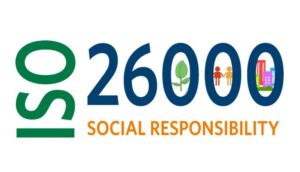Last updated on October 27th, 2025 at 06:08 pm
In today’s world, businesses are evaluated not only on their profits, but also on their social impact. As a result, it has become increasingly important for organisations to demonstrate ethical, transparent, and socially responsible behaviour. ISO 26000 certification serves as a globally recognised guideline for integrating social responsibility into business operations.
Unlike management system standards like ISO 9001 or ISO 14001, ISO 26000 is a guideline standard that outlines how organisations can fulfil their responsibilities to various stakeholders, including employees, customers, the community, and the environment.
If your business wants to enhance its ethical reputation, build stakeholder trust, and improve its brand image, obtaining ISO 26000 certification may be an ideal choice.
What is ISO 26000?
ISO 26000 is an international standard focused on social responsibility (SR), developed by the International Organisation for Standardisation (ISO). Its primary objective is to guide organisations in adopting socially responsible practices in their daily operations and decision-making processes.
This standard applies to all sectors, including public, private, and non-profit organisations. ISO 26000 emphasises seven fundamental principles of social responsibility. By adhering to these principles, ISO 26000 enables organisations to achieve their business goals while also having a positive impact on society and the environment.
- Accountability
- Transparency
- Ethical behaviour
- Respect for stakeholders’ interests
- Compliance with the rule of law
- Adherence to international conduct norms
- Respect for human rights
Uses of ISO 26000
ISO 26000 offers various applications, assisting organisations in defining and accomplishing their social responsibility aims. Some notable advantages of this standard include:
- Enhancing an organisation’s image as ethical and responsible.
- Aiding in the pursuit of sustainability objectives.
- Fostering trust and goodwill with stakeholders, customers, and communities.
- Guaranteeing fair labour practices among employees and partners.
- Promoting positive contributions to both the environment and the community.
- Increasing awareness regarding legal compliance and international ethical standards.
Importance of ISO 26000 Certification
In today’s competitive marketplace, where consumers prioritise social impact, achieving ISO 26000 certification provides a strategic advantage. Achieving ISO 26000 certification demonstrates that your organisation is committed not only to effective business practices but also to society and the environment. This certification enhances your credibility globally and helps establish your brand as responsible and sustainable.
- Enhances corporate reputation and stakeholder trust.
- Supports Corporate Social Responsibility (CSR) initiatives.
- Encourages ethical decision-making and transparency.
- Increases customer loyalty through responsible practices.
- Helps organisations align with the United Nations Sustainable Development Goals (SDGs).
- Improves employee engagement and workplace culture.
Scope of ISO 26000
ISO 26000 applies to organisations of all types and sizes, including multinational corporations (MNCs), small and medium-sized enterprises (SMEs), government bodies, and non-governmental organisations (NGOs). This standard helps each organisation clearly define its Corporate Social Responsibility (CSR) framework and ethical obligations. Its scope includes the following key areas:
- Human Rights
- Labour Practices
- Environmental Protection
- Fair Operating Practices
- Consumer Issues
- Community Participation and Development
- Organisational Governance
By focusing on these areas, ISO 26000 enables organisations to establish positive social impact while promoting long-term sustainable development.
Documents Required for ISO 26000 Certification
- Corporate Social Responsibility (CSR) Policy and Implementation Plan

- Code of Ethical Conduct
- Environmental Management Report
- Stakeholder Engagement Record
- Risk Assessment and Mitigation Plans
- Training and Awareness Record
- Internal Review and Monitoring Report
- Social Impact Report
Proper documentation demonstrates that the organization has effectively integrated social responsibility practices into its operations.
Process to Obtain ISO 26000 Certification
The ISO 26000 certification process follows a structured approach, enabling organizations to integrate the principles of social responsibility effectively.
Initial Assessment (Gap Analysis):
The first step involves identifying gaps between the organisation’s current CSR practices and ISO 26000 guidelines.
Planning and Strategy Development:
Organisations formulate their CSR objectives, policies, and stakeholder engagement plans.
Documentation:
Documenting social responsibility commitments, ethical codes, and sustainability policies is essential.
Implementation:
Documented policies are implemented in the organisation’s daily operations, focusing on areas such as ethical sourcing, fair labour practices, and community development initiatives.
Internal Review:
Internal audits and performance reviews ensure that the CSR system is effectively implemented.
External Evaluation/Audit:
An accredited certification body evaluates the organisation’s social responsibility framework and verifies compliance with the guidelines.
Certification:
Upon successful completion of the audit, the organisation receives ISO 26000 certification, which symbolises global recognition of its responsible and ethical practices.
Continuous Improvement:
After receiving certification, the organisation is encouraged to continually review and improve its CSR initiatives.
Cost of ISO 26000 Certification
The cost of ISO 26000 certification varies from organisation to organisation, depending on factors such as the organisation’s size, scope of operations, number of locations, and the level of implementation required. However, it is important to view this cost as a long-term investment. Obtaining ISO 26000 certification can provide significant benefits, including improved brand reputation, stakeholder trust, and sustainable growth.
Why Choose A Star Legal Associates?
A Star Legal Associates is India’s leading ISO consultancy firm, specialising in all types of ISO certification, including ISO 26000. We provide comprehensive support to organisations, covering every aspect from gap analysis and documentation to implementation and final certification.
Our expert team ensures that your Corporate Social Responsibility (CSR) framework is in line with global social responsibility standards, enhancing your organisation’s credibility and sustainability. We are committed to making this process easy, time-efficient, and cost-effective so that you can maintain socially responsible practices while pursuing your core business objectives.
Conclusion
In today’s competitive landscape, organisations are evaluated not only on their profits, but also on their social values and ethical conduct. Obtaining ISO 26000 certification demonstrates a business’s commitment to society, the environment, and ethical governance.
By following the guidelines set forth by ISO 26000, an organisation can promote trust, transparency, and sustainability in all its operations. This certification sends a strong message that your company is dedicated not only to business growth but also to social development and environmental protection. If you want to transform your organisation into a socially responsible and globally recognised brand, obtaining ISO 26000 certification is a wise and strategic move.
For professional assistance with ISO 26000 certification, contact A Star Legal Associates at +91 9314321001—India’s trusted partner for all ISO certification needs.




